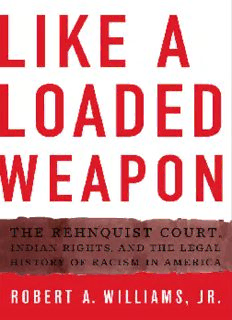
Like a Loaded Weapon: The Rehnquist Court, Indian Rights, and the Legal History of Racism in America (Indigenous Americas) PDF
Preview Like a Loaded Weapon: The Rehnquist Court, Indian Rights, and the Legal History of Racism in America (Indigenous Americas)
LIKE A LOADED WEAPON I A NDIGENOUS MERICAS Robert Warrior and Jace Weaver, Series Editors Daniel Heath Justice, Our Fire Survives the Storm: A Cherokee Literary History Thomas King, The Truth About Stories: A Native Narrative Robert Warrior, The People and the Word: Reading Native Nonfi ction Robert A. Williams, Jr., Like a Loaded Weapon: The Rehnquist Court, Indian Rights, and the Legal History of Racism in America LIKE A LOADED WEAPON The Rehnquist Court, Indian Rights, and the Legal History of Racism in America Robert A. Williams, Jr. INDIGENOUS AMERICAS University of Minnesota Press ß Minneapolis ß London Copyright 2005 by the Regents of the University of Minnesota All rights reserved. No part of this publication may be reproduced, stored in a retrieval system, or transmitted, in any form or by any means, electronic, mechanical, photocopying, recording, or otherwise, without the prior written permission of the publisher. Published by the University of Minnesota Press 111 Third Avenue South, Suite 290 Minneapolis, MN 55401-2520 http://www.upress.umn.edu Library of Congress Cataloging-in-Publication Data Williams, Robert A., 1955– Like a loaded weapon : the Rehnquist court, Indian rights, and the legal history of racism in America / Robert A. Williams, Jr. p. cm. — (Indigenous Americas) Includes bibliographical references and index. ISBN 0-8166-4709-7 (hc : alk. paper) — ISBN 0-8166-4710-0 (pb : alk. paper) 1. Indians of North America—Civil rights—History. 2. Race discrimination—Law and legislation—United States—History. 3. Racism—United States—History. 4. United States—Supreme Court. 5. Rehnquist, William H., 1924– I. Title. II. Series. KF8210.C5W55 2005 342.7308'72—dc22 2005018328 Printed in the United States of America on acid-free paper The University of Minnesota is an equal-opportunity educator and employer. 12 11 10 09 08 07 06 05 10 9 8 7 6 5 4 3 2 1 For Vine This page intentionally left blank A military order, however unconstitutional, is not apt to last longer than the military emergency. Even dur- ing that period a succeeding commander may revoke it all. But once a judicial opinion rationalizes such an order to show that it conforms to the Constitution, or rather ra- tionalizes the Constitution to show that the Constitution sanctions such an order, the Court for all time has validated the principle of racial discrimination. . . . The principle then lies about like a loaded weapon ready for the hand of any authority that can bring forward a plausible claim of an urgent need. Every repetition imbeds that principle more deeply in our law and thinking and expands it to new pur- poses. All who observe the work of courts are familiar with what Judge Cardozo described as “the tendency of a prin- ciple to expand itself to the limit of its logic.” —Justice Robert Jackson, dissenting, in Korematsu v. United States This page intentionally left blank Contents xi Acknowledgments xiii Introduction Part I. Discovering a Language of Racism in America 3 1. “Look, Mom, a Baby Maid!” The Languages of Racism 17 2. The Supreme Court and the Legal History of Racism in America Part II. “Signs Taken for Wonders”: The Nineteenth- Century Supreme Court and Indian Rights 33 3. “The Savage as the Wolf”: The Founders’ Language of Indian Savagery 47 4. Indian Rights and the Marshall Court 71 5. The Rise of the Plenary Power Doctrine Part III. The Twentieth-Century Post-Brown Supreme Court and Indian Rights 89 6. What “Every American Schoolboy Knows”: The Language of Indian Savagery in Tee-Hit-Ton 97 7. Rehnquist’s Language of Racism in Oliphant 115 8. The Most Indianophobic Supreme Court Indian Law Opinion Ever
Description: